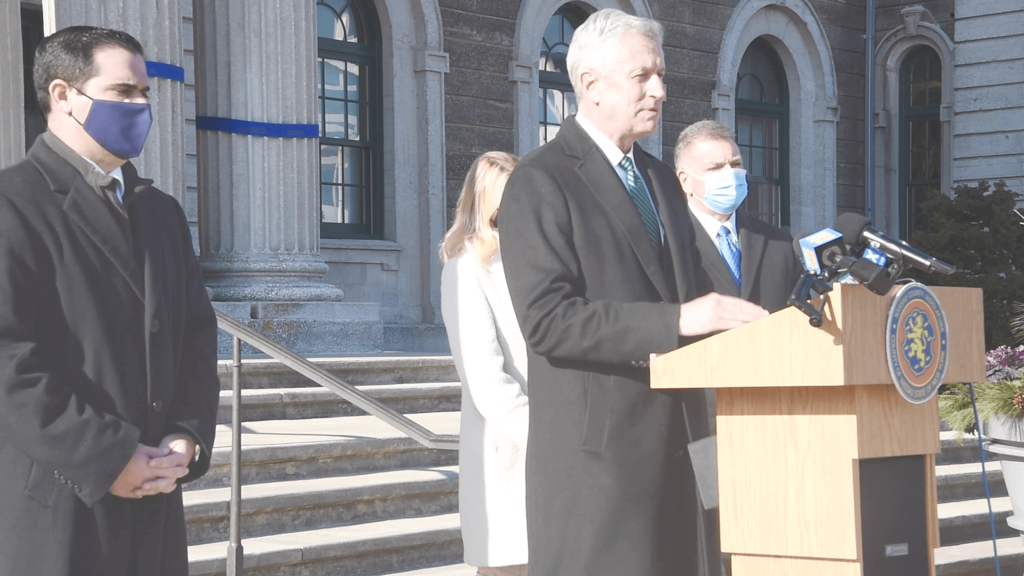As this is an election year in Nassau County politics, and assessment is a politically fraught issue, Republicans have made hay of what they see as a bungled roll-out of the Democratic administration’s reassessment efforts.

(Photo courtesy of the office of Laura Curran)
Since December, officials in Nassau County Executive Laura Curran’s assessment department have admitted that Adapt, a complex and aging software program, led to mistakes in tax bills sent out by the county.
Last month, officials revealed that about 4,700 bills sent to veterans and 800 to members of the clergy did not properly phase in the exemptions over the required five years under the taxpayer protection plan designed to soften the blow of the increases.
On Jan. 25, Curran and the legislature passed an emergency resolution to fix the mistakes. Also that day, in a legislative committee hearing, Robert Miles, deputy assistant assessor and counsel for the Department of Assessment, and Jeremy May, vice chair and counsel of the Assessment Review Commission (ARC), were grilled for several hours by members of the Majority about the mistakes and the general course of the reassessment process.

(Photo by Frank Rizzo)
Presiding Officer Richard Nicolello (R-New Hyde Park) opened the meeting by noting that the “legislature provided the tools necessary for the reassessment and the county executive is the one supervising and [implementing] it.”
But the resulting changes in assessment, he charged, resulted in many residents facing “sticker shock, having opened their bills. So we’re back again to ask questions and get information for our residents, many of whom are concerned about the actual impact of the reassessment and they are concerned, some very justifiably so, that they can no longer afford to live in Nassau County.”

(Photo by Frank Rizzo)
Legislator John Ferretti (R–Levittown), chair of the veterans and seniors committee, stated, “I think it’s important that we highlight how the veterans and seniors have been impacted by the process.”
He added, “Since the beginning of this year, taxpayers have been contacting legislative offices to [state that their tax bills] that have doubled or tripled between 2020 and 2021. Such an increase is unconscionable. Accordingly, we should get to the bottom of this and we seek to do so today.”
Regarding the veterans exemptions, Miles said, “It’s a computer error. The application was provided the instructions to apply the taxpayer protection plan to special districts and it did not.”
He added, “There are 400-plus special districts throughout the county. And there is some overlap with certain parcels and some that are not. It’s very complex in terms of the exemptions and tax bills for special districts.”
“Did someone miss this or is there no safeguard?” Ferretti asked.
“I believe this is such a unique circumstance that it’s difficult to find,” Miles replied, adding that Adapt had made mistakes before and it was an issue not unique to the Curran administration.
In another exchange with Steve Rhoads (R–Wantagh), Miles admitted that the software needed changes and improvements but it was integral to the operations of his department, as well as the ARC and the treasurer’s office.
Rhoads emphasized that when one of these problems occur, it impacts real people.
“As much as we would like to say, ‘Hey, it’s the computer’s problem,’ the computer works for the department of assessment,” he said. “At some point in time it has to become the department’s problem. It has to become the government’s problem to try to fix a system that isn’t working.”

(Photo by Frank Rizzo)
Miles assured Rhoads his department was constantly practicing quality control and if they could not fix the Adapt problem, they would then need to move on from it.
“It’s an extremely unique situation,” he said. “I don’t think anyone in the department has ever seen a situation like this. But we’re going to put controls in so that this and similar issues can be [anticipated]. And make sure things like this won’t happen again.”
Schools As Culprits?
Nicolello, Ferretti and Rhoads all focused on what they called discrepancies between the tax impact notices sent to property owners, with their estimates of the upcoming tax year estimates, and the actual tax bills. Many saw a much bigger bill than what had been estimated.
Miles blamed increases on rising school budgets, which he ascribed to the effects of the pandemic. He pointed out that the impact statements were based on the previous year’s school taxes and did not account for the increases.
This situation also undermined the administration’s assurances that the effects of the reassessment would be equal, with about 50 percent seeing an increase and an equal percentage an decrease in their tax burden.
A widely cited study by Newsday concluded that 65 percent of taxpayers will see increases in school taxes.
The legislators were skeptical of the school budget explanation, which even Curran herself has put forth.
Rhoads claimed that “homeowners are seeing 5, 10, 20, 50 or even 100 percent increases in school taxes,” while actual school budgets went up by only low single digits.
“How do those two things equate?” he wondered, and asserted, “That’s not because the school budgets increased by 3 or 4 percent. That’s because the assessment caused that.”
Adding to the conflict, on Jan. 29, Ferretti and Rhoads filed an Article 78 suit in Nassau County Supreme Court against the administration, charging it with “continued failure to be transparent with the Nassau County residents.”
The lawsuit demands that Curran follow the resolution approved unanimously by the legislature in December and which she signed. It calls for the administration “to restore to the official website of Nassau County the full value of the Class 1 reassessment exemption…including an estimate of the local tax impact of the exemption will have on such properties for school and general taxes.”
Chris Boyle, a spokesperson for the Majority, told Anton Media Group at press time that the executive branch has not yet complied.
Asked for a response to the lawsuit, Michael Fricchione, a spokesperson for Curran, answered, “While the county executive continues to focus on fighting for more doses of life-saving vaccine, keeping small businesses open and our kids in school, GOP Legislators are playing politics with assessment after ignoring it for years.”
Curran came into office in 2018 determined to reassess residential properties after her predecessor, Ed Mangano, froze the rolls during his 8-year term. She argued that the unchanging assessment values during a rising market created unfair conditions; homeowners who successfully grieved their assessments saw a much slower rise in their property taxes.
The first tax bills issued under the new property valuation have caused sticker shock for many taxpayers who had been paying lower rates during a period of frozen assessments.































